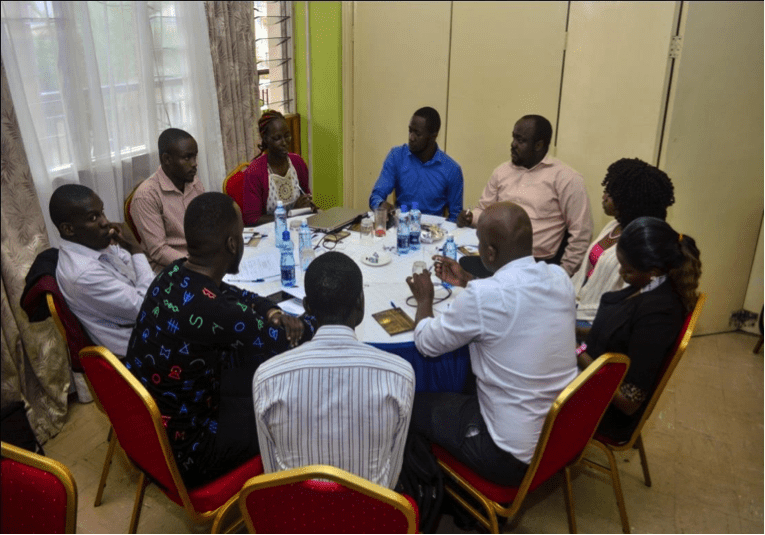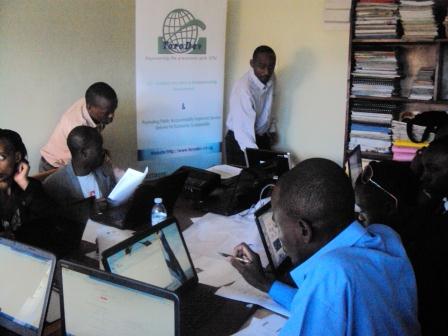By Tracy Kadesa |
Youths have emerged at the forefront of online activism and citizen journalism in Kenya. During a December 2016 to March 2017 strike by doctors, young doctors shared their grievances online, ranging from lack of resources in government hospitals to inadequate staffing and poor compensation. One of the stories was that of Dr. Ouma Oluga, the secretary general of the Kenya Medical Practitioners, Pharmacists and Dentists Union, who shared how he had to perform a caesarean section using a torch on his mobile phone due to a power outage. He was only 27 at the time.
Ahead of Kenya’s elections scheduled for August 2017, there have been increased calls for young Kenyans to participate in related processes and vote as a means of positively influencing concerns such as the high rates of unemployment. According to a 2016 World Bank report, Kenya has among the highest youth unemployment rates in Africa.
Against this background, on May 9-10, 2017, the Collaboration on International ICT Policy for East and Southern Africa (CIPESA) convened 30 youth and civil society activists to explore rights and responsibilities, as well as effective and secure ways to engage in the country’s governance processes including through ICT.
The workshop raised awareness about various ICT-based initiatives that have given Kenyan youths an opportunity to regularly discuss issues and analyse the manifestos of candidates running for elective posts. For instance, SiasaPlace runs weekly Twitter chats using #SiasaWednesday with the aim of amplifying women and youth voices. Siasa Place is a hub and co-working space that is passionate about engaging youth and women on civic agency.
Tribeless Youth is another vibrant movement that uses Twitter to engage youth in governance. Ongoing discussions facilitated by #TribelessYouth include #MeetTheNewCandidates where first-time political candidates, mostly youthful ones, are given an opportunity to present what they plan to deliver if elected come August.
Other youth-led initiatives that participated in the workshop included Fatuma’s Voice, a youth empowerment organisation, and Centre for Public Engagement & Social Economic Affairs Kenya (CPESEAK), which works on promoting youth participation in social accountability. Irungu Houghton of Society for International Development; Kenya Dialogues Project (KDP) participated as guest speaker and highlighted KDP’s commitment to advancing youth leadership in Kenya.
The workshop also explored government efforts to motivate the youth to participate in the August 2017 general elections through an initiative dubbed Y-VOTE (Youth Vote). The initiative spearheaded by the Independent Electoral and Boundaries Commission (IEBC) in partnership with the International Foundation for Electoral systems (IFES) leverages social media and on-ground activations to mobilise 18-29 year olds to vote come August 8. The campaign was launched on June 20, 2017 and run to late July.
Participants in the workshop explored ways of leveraging the various civic agency and elections-related initiatives to exercise their rights but also champion a peaceful electioneering period through online activism. Furthermore, discussions entailed digital safety tools and practices to facilitate secure communications.
The participants agreed that they were “no longer leaders of tomorrow but of today” and it was therefore their duty to zealously participate in governance processes towards improved livelihoods. See more insights in video below.
The youth in governance in Kenya workshop was organised in the context of the ICT4Democracy in East Africa initiative which is aimed at leveraging ICT to promote civic participation, democratic governance and respect for human rights.
ToroDev trains rural youth and women in online advocacy for improved service delivery
 ToroDev has started training rural women and youth leaders in the seven districts of the Rwenzori Region in using online tools to monitor service delivery. The maiden residential 2 days training involving ten participants was held on 16th – 17th of August, 2012 at ToroDev resource center in Fort Portal, Uganda. The training which is supported by ToroDev in partnership with SPIDER/Stockholm University was facilitated by Milton Aineruhanga from WOUGNET.
ToroDev has started training rural women and youth leaders in the seven districts of the Rwenzori Region in using online tools to monitor service delivery. The maiden residential 2 days training involving ten participants was held on 16th – 17th of August, 2012 at ToroDev resource center in Fort Portal, Uganda. The training which is supported by ToroDev in partnership with SPIDER/Stockholm University was facilitated by Milton Aineruhanga from WOUGNET.
ToroDev will train 210 rural monitors and advocates in online/ Web 2.0 tools to collect, document and disseminate online public accountability for improved serviced delivery issues. They will particularly oriented on how to interact with the “Ushahidi” online platform and other relevant open-source software. The monitors were also trained in online social media tools, human rights, governance and democratic engagement.
The monitors were highly trained to be independent local citizens that will keep updating the community and project team at ToroDev about the status of service delivery and identifying communities own service delivery needs.
They will further go ahead to mobilize and encourage regular meetings and focus group discussions (FGDs) among the 14 Advocacy Forums in the region on issues of service delivery monitoring.
Rural Monitors will also advocate for quality and timely public accountability from local leaders. They will use 11 radio stations in the Rwenzori region as a major tool for distributing/disseminating all the information accessed through online/internet and mobile phones.
This information will be converged on the FM radio stations as a way of sharing information with the rest of grass root citizens in the region, who may not necessarily have the skills and afford town or access internet based knowledge tools. The rural FM radio will be used a hub for the convergence of all ICT tools for effective service delivery monitoring in the Rwenzori Region.
Some of the sample articles posted by the rural monitors on the Ushahidi platform.
http://wougnet.org/ushahidi/reports/view/59
http://wougnet.org/ushahidi/reports/view/66
http://wougnet.org/ushahidi/reports/view/62
http://wougnet.org/ushahidi/reports/view/64
http://wougnet.org/ushahidi/reports/view/56
http://wougnet.org/ushahidi/reports/view/51
Documented by Solomon Akugizibwe
This article was published on August 28, 2012, about the ICT4Democracy in East Africa project, which brings together various partners in the region – among them CIPESA.
For more information, visit www.ict4democracy.org


